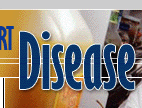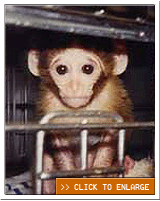Click here to go back.
DRUG TESTING ON ANIMALS
The search for a miracle drug has pharmaceutical companies aggressively competing for the profits such a drug would afford. This frenzy has drug companies testing numerous experimental medications, killing millions of animals every year. Animals in these laboratories spend their short lives locked in cages, given test drugs, observed, killed and dissected. If painful side effects are noticed, they are logged and nothing more; to administer pain relief would be interfering with the study.
Drug testing on animals has caused harm and death to humans, too. Currently our federal law requires that prescription medications be tested on animals for safety, but animal-based data do not reveal a medication’s effect on a human body. For example, the heart drug Eraldin caused blindness and 23 deaths after animal testing revealed no adverse effects. The heart medication Perhexiline caused liver failure in humans. In both cases, once human effects were known, scientists were still unable to reproduce these effects in animals. These are but two of many examples of the failure of animal tests to predict human safety and toxicity.
The plant digitalis has been used to safely treat heart disorders for centuries. Yet clinical trials of a digitalis-based drug, digoxin, were delayed because it caused high blood pressure in dogs. Once the human evidence overrode the animal data, the drug digoxin was subsequently used and has saved countless lives. Had clinical trials been used throughout, digoxin would have been released sooner and could have saved many more lives.
Even when a drug tests successfully in animals but is then unsuccessful in humans, drug companies continue to promote it, based on the animal experiments. This was seen recently with the anti-cholesterol drug Baycol. Company documents indicate executives knew patients were becoming ill and dying, yet they continued to market it. The drug was recalled only after it was linked to more than 50 deaths, a number that then rose to over 100. The company faced almost 10,000 lawsuits against them, and has settled over one thousand of these cases by paying hundreds of millions of dollars.
The reliance on animal tests to determine human safety is
misleading, inaccurate and harmful to humans and animals. In fact, adverse reactions to drugs deemed safe through animal tests are the fourth-leading killer of Americans, ironically killing more people each year than all illegal drugs combined.








